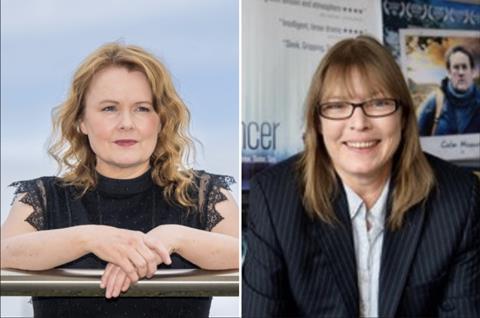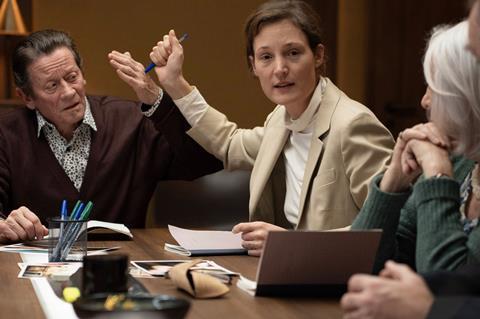
The Galway Film Fleadh opens today (July 8) with a record 45 Irish features in the line-up, including 11 in the Irish language.
“It bowled us over – there are some beautiful independent films coming through,” says director of programming Maeve McGrath. “There’s a confidence [in Irish production].”
The festival opens with Jim Sheridan and David Merriman’s Re-Creation starring Vicky Krieps, which is based on the infamous unsolved murder of French filmmaker Sophie Toscan Du Plantier in west Cork. It arrives fresh from its world premiere at Tribeca.
Further homegrown highlights from the line-up include Colum Eastwood’s horror The Morrigan, Eamon Murphy’s Solitary, Trevor Birney’s Good Friday agreement documentary The Negotiator and Ruán Magan’s Irish-language Báíte (The Drowning).
On the industry side, the marketplace will provide Irish filmmakers with the chance to connect with representatives from international film sales and financiers, with over 700 meetings planned at the Creative Europe Media-supported Galway Film Fair (the first led by new director William Fitzgerald). Executives from 25 countries are taking part, including from Altitude, Bankside, BBC Film, BFI, Cornerstone, Curzon, Embankment, Film4, Hanway, Head Gear, Mister Smith, Protagonist, Vue Lumiere and WestEnd from the UK and Archstone Entertainment, Magnolia Pictures and WME out of the US.
As well as the €3,000 cash prize for the best marketplace project award, two new prizes have been added this year: the best documentary project award, with a prize of a year-long consultancy with Impronta Films on the winning project, and the audience design award, the prize of which is a workshop with consultant Síle Culley on audience and communication strategies.
France is the country of focus, with French producers attending including David Thion, whose credits include two Palme d’Or winners, It Was Just An Accident and Anatomy Of A Fall, as well as Marie-Ange Luciani, Marine Mary, Alexis Perrin, Maud Berbille and Xènia Maingot.
This year, the Fleadh has faced an additional hurdle, after its key screening venue, the Pálás Cinema, shut in February. The three-screen cinema, previously part of Element Pictures’ Light House Cinema Group, attributed rising costs, Covid and “oversaturation” of commercial cinemas as factors in its closure. Galway City Council is currently seeking an operator, but there is no guarantee the venue will return as a cinema. The Pálás will re-open for the festival this year, but there is uncertainty around what will come next.
Screen talks to festival heads, CEO and co-founder Miriam Allen and McGrath about the growth of Irish cinema, venue challenges and the need for more comedy.
What are some of your highlights from this year’s line-up?
Maeve McGrath: I will never forget the day I watched Winter In Sokcho – it resonated with me. It’s that slow cinema, it’s that really beautiful storytelling, and [director] Koya Kamura is coming in which we’re really excited about.
Another favourite, out of Rotterdam, was And The Rest Will Follow. I love anything that has a film festival within a film festival film.

Why has the number of Irish films in the programme has increased to 45, from the previous record of 33?
MM: There’s a confidence [in Irish production]. Out of the 45 films, you have people with very wide, prolific careers – Trevor Birney, people like that – and emerging filmmakers coming in.
The funding bodies hold a lot of responsibility here. There is more funding coming out, there’s the [Irish language] Cine4 scheme, obviously Screen Ireland, Coimisiún na Meán.
What’s the latest with the Pálás venue?
MM: Galway City Council has been really great and supportive of us getting in this year, probably knowing it may be our last year. They are looking for expressions of interest from people to operate the venue, but not just as a cinema. Some people have ideas to open an escape room, others are saying knock it down.
It’s such a beautiful, brutalist building. It’s a core part of the Fleadh – there are three cinema [screens] in there, whereas the town hall only has one. I think the expressions of interest, whatever comes in, may not meet what we need.
If the venue doesn’t return as a cinema, where might the Fleadh be based from next year onwards?
MM: We’ve kind of taken on the management and running of the cinema [for this edition]. It’s been a big, big thing – we haven’t looked ahead next year or further.
Could the Fleadh team be interested in taking over the running of the cinema, full-time?
Miriam Allen: We’re thinking about it. Expressions of interest don’t have to be in until after the Fleadh – you can take all of the learnings, and figure out if this is something you’d be up for.
As well as the Pálás closure, what are the major challenges facing the Fleadh?
MM: I’m always thinking, what do audience members want to see? They want to see themselves on screen, they want to see interesting documentaries, and they all want to see more comedy. There are lots of very sad films. I get a lot of films about dementia, loneliness, both in narrative and documentary – horror, tragedy, conflict. But to get a real comedy, I’d love to see more of that.
A big challenge this year for me was finding that gender balance, it was very difficult. We have a lot of women and various genders on screen, which is great. But in terms of women behind the camera as directors, they’re not there to find.
We have some amazing male directors, that’s not to take away from them, but this year in particular, film after film after film that came in [were directed by men]. Ireland has a lot of female producers, that’s not an area I see a drought in. I don’t know if it’s a funding thing, I don’t know.
Raising Films Ireland, in partnership with Screen Ireland’s National Talent Academies, is introducing a pilot childminding service at the Fleadh this year. Is this something you’ll be looking to build on in the future?
MA: Totally. We’re the first festival they are doing the pilot in. It’s booked out already. I’ve been working on the festival for 37 years, I had two children throughout those years, I just brought them to work with me. It’s going to be based in [industry hub] The Galmont. I think it’s a fantastic thing.

























No comments yet